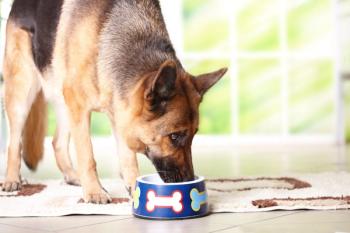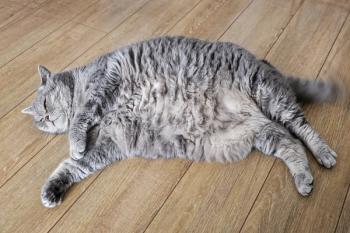
Introducing Iams Senior Plus Formulas
New Iams Senior Plus diets are specially formulated to address the needs of older pets.
As dogs and cats age, they enter a fourth senior life stage around the age of 11 (age 9 for largebreed dogs and age 7 for giant-breed dogs). Health concerns for these older pets include vision loss from cataracts or other ocular diseases, hearing loss from cochlear degeneration, decrease in taste acuity and weight loss, reduced ability to extract energy from food, loss of mobility and flexibility, changes in cognitive function, and dental problems. In addition, research has shown that with increasing age, pets can gain fat and lose lean tissue,1 have an age-related decline in immune response,2 and have impaired glucose tolerance.3 Thus, this senior life stage can be characterized by a need for extra support of age-vulnerable body systems and functions such as muscle mass, body condition, fat metabolism, eye health, immune function, neural health, mobility, digestion, and oral health.
New Iams Senior Plus diets are specially formulated to address the needs of older pets. They include
- High levels of high-quality protein from chicken and egg, with added lysine, to help maintain muscle mass
- More fat (vs. adult maintenance formulas) to help maintain ideal weight and body condition
- L-carnitine to help pets utilize dietary fat
- Antioxidants to help maintain immune health
- An adjusted omega-6:omega-3 fatty acid ratio for skin and coat health
- Natural sources of glucosamine and chondroitin sulfate
- Prebiotic fructooligosaccharides and beet pulp to help maintain healthy digestion
- Crunchy kibble, with hexametaphospate to help slow tartar buildup in dogs
Veterinarians now have additional choices available for older dogs and cats so they can more carefully tailor the nutritional needs of their mature adult and senior patients. Veterinarians can recommend Iams ProActive Health and Iams Premium Protection Mature Adult diets for pets in the third midlife stage and new Iams ProActive Health and Iams Premium Protection Senior Plus diets to help senior pets stay healthy and active with additional nutritional support during this important fourth life stage.
References
1. Hayek MG. Age-related changes in physiological function in the dog and cat: nutritional implications. In: Reinhart GA, Carey DP, eds. Recent advances in canine and feline nutrition. Vol II. 1998 Iams Nutrition Symposium Proceedings. Wilmington, Ohio: Orange Frazer Press, 1998;353-362.
2. Kearns R, Hayek M, Turek J, et al. Effect of age, breed and dietary omega-6 (n-6):omega-3 (n-3) fatty acid ratio on immune function, eicosanoid production, and lipid peroxidation in young and aged dogs. Vet Immunol Immunopathol 1999;69:165-183.
3. Massimino SP, Sunvold GD, Burr J, et al. The effects of age on glucose tolerance and body composition in the cat, in Proceedings.ACVIM, Chicago, Ill., 1999.
Newsletter
From exam room tips to practice management insights, get trusted veterinary news delivered straight to your inbox—subscribe to dvm360.




